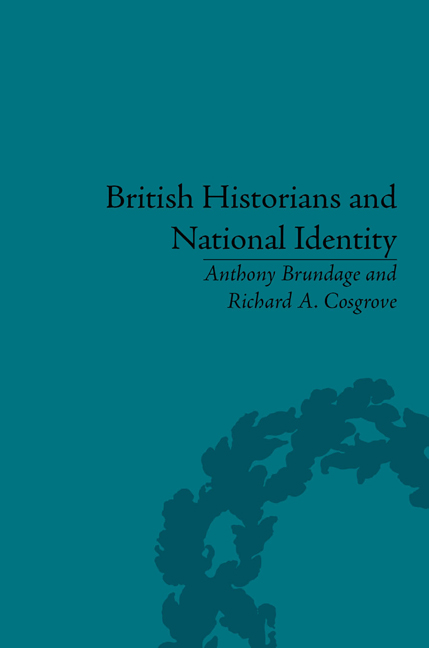Book contents
- Frontmatter
- CONTENTS
- Dedication
- Acknowledgements
- Introduction
- 1 Demythologizing the Nation's Past: David Hume's History of England
- 2 Catharine Macaulay's Vindication of Radicalism and the Republican Tradition
- 3 Reassessing Religion and the National Narrative: John Lingard and the English Reformation
- 4 Placing the Constitution at the Heart of National Identity: Henry Hallam and Constitutional History
- 5 Thomas Babington Macaulay: Writing the History of a Progressive People
- 6 The Glories of the Reformation and the Origins of Empire: J. A. Froude's Celebration of the Tudor Era
- 7 Edward Augustus Freeman: Liberal Democracy and National Identity
- 8 William Stubbs: The Continuity of English History as National Identity
- 9 Celebrating the People: J. R. Green's Short History
- 10 Samuel Rawson Gardiner: Incorporating Dissent into the National Story
- 11 In Thrall to English Tradition and Character: G. M. Trevelyan's Panoramic Histories of the Island Race
- 12 The Anglosphere as Global Model: Winston Churchill's History of the English-Speaking Peoples
- Conclusion
- Notes
- Works Cited
- Index
12 - The Anglosphere as Global Model: Winston Churchill's History of the English-Speaking Peoples
- Frontmatter
- CONTENTS
- Dedication
- Acknowledgements
- Introduction
- 1 Demythologizing the Nation's Past: David Hume's History of England
- 2 Catharine Macaulay's Vindication of Radicalism and the Republican Tradition
- 3 Reassessing Religion and the National Narrative: John Lingard and the English Reformation
- 4 Placing the Constitution at the Heart of National Identity: Henry Hallam and Constitutional History
- 5 Thomas Babington Macaulay: Writing the History of a Progressive People
- 6 The Glories of the Reformation and the Origins of Empire: J. A. Froude's Celebration of the Tudor Era
- 7 Edward Augustus Freeman: Liberal Democracy and National Identity
- 8 William Stubbs: The Continuity of English History as National Identity
- 9 Celebrating the People: J. R. Green's Short History
- 10 Samuel Rawson Gardiner: Incorporating Dissent into the National Story
- 11 In Thrall to English Tradition and Character: G. M. Trevelyan's Panoramic Histories of the Island Race
- 12 The Anglosphere as Global Model: Winston Churchill's History of the English-Speaking Peoples
- Conclusion
- Notes
- Works Cited
- Index
Summary
Like Trevelyan, Winston Churchill (1874–1965) was born into a highly privileged family, indeed one at the pinnacle of the aristocracy. But unlike Trevelyan, who was financially secure throughout his life from family money, Churchill had to make his own way. Imitating his parents, the flamboyant and impecunious Lord Randolph Churchill and the free-spending American heiress Jenny Jerome, he was beset throughout his life by one financial crisis after another. Temperamentally, the two men were poles apart, with the cautious, introverted Trevelyan embracing the quiet and seclusion of a well-ordered life, while Churchill loved society and lively company. The former's pastoralism and longing for simpler, less hectic times made him uncomfortable in the frenetic twentieth century, while Churchill relished the challenges of modern times. Both men held conservative views about government and society, but Trevelyan's were more rooted in an imagined, benign early Georgian social order, while Churchill celebrated the ability of the aristocracy and the upper classes to maintain a measure of authority into his own day.
Trevelyan's immersion in the quiet rigour of a scholarly existence was natural to him, while Churchill was clearly marked out for a vivid public life, one that was both contentious and (to use a term that frequently occurs in his written works), thrusting.
- Type
- Chapter
- Information
- British Historians and National IdentityFrom Hume to Churchill, pp. 179 - 194Publisher: Pickering & ChattoFirst published in: 2014



